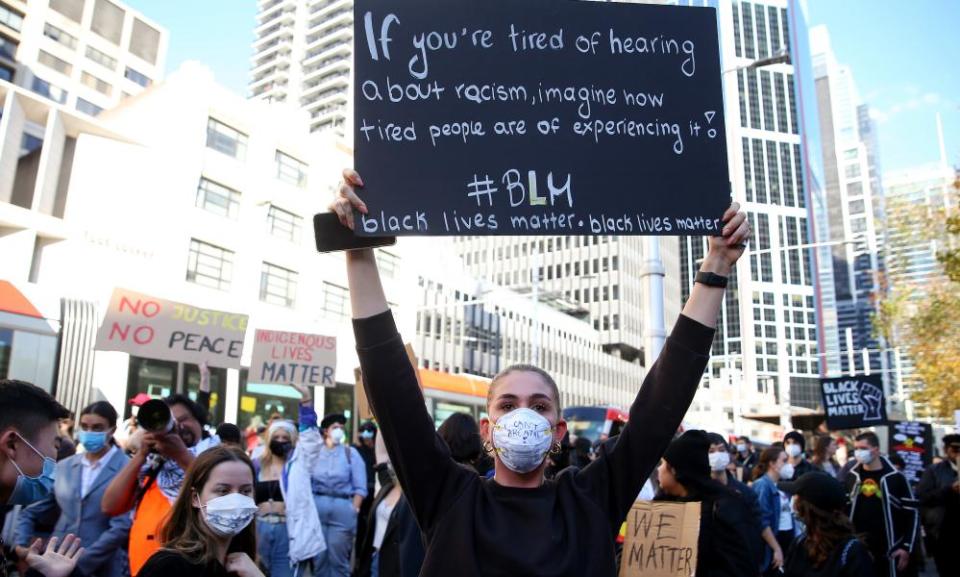We need more, not less, critical thinking about race in Australia

How unsurprising to learn that the assistant minister to the attorney general, Amanda Stoker, raised objections to the Australian Human Rights Commission’s “Racism, It Stops With Me” campaign because it mentions “anti-racism”, which the senator said is associated with critical race theory (CRT). Stoker’s intervention, which led to the tender for the campaign being temporarily pulled, signals the Australian right’s agenda to join the war on CRT.
While this latest battle in the culture wars might appear to be about academic freedom – witness for example the French state’s attack on academic research on race as flouting the “values of the Republic” – the ultimate aim of the anti-CRT warriors is to destroy the anti-racist movement. It was following the unprecedented enormity of the Black Lives Matter protests around the world in 2020 that the right redoubled its attempts to discredit its demands for justice for Black people by writing them off as the musings of an out-of-touch postmodernist academic elite.
Related: Human Rights Commission vows to continue anti-racism program after Amanda Stoker complaint
As with the moral panics of the 1990s, which conjured up the strawman of “political correctness gone mad” and, in Australia, the Black Armband view of history, today’s folk devil – critical race theory – is touted as irrational and dangerous. The core of the right’s misrepresentation of CRT is that it preaches “hatred of white people” to impressionable young people in schools. CRT, it is claimed, contributes to further dividing an already incohesive society, splintered by too many years of misguided multicultural policies which were foisted upon well-meaning publics by minorities determined to live segregated lives. As one of the founders of CRT, Professor Cheryl Harris put it, the aim to discredit and ban CRT, “is a ploy intended to gin up the idea that anti-racist work is itself racist – against whites.”
Of course, these myths cover up the truth, that Australia continues to be dominated by white elites, that systemic racism as manifested both in the out of control incarceration of Aboriginal and Torres Strait Islander peoples and their deaths at the hands of the state, as well as the everyday discrimination experienced by racialised people across all domains of life, is rife. The attacks on CRT are in lockstep with a white nationalism determined to hold on to power. By representing CRT not only as “anti-white” but also as encouraging racial separatism, the right cleverly positions itself as the real opponent of racism, determined to give everyone an equal chance in a “meritocracy” rather than giving racialised people what are painted as demeaning hand-outs.
We can see how this way of presenting things seems like commonsense in a liberal society where, despite all evidence to the contrary, the dominant belief is that, as Scott Morrison put it, “if you have a go, you get a go.” However, you don’t have to look very far in Australia as elsewhere, especially during Covid, to see that the “fair go” while certainly a nice idea, would be nicer if true.
What is referred to as CRT has little to do with the scholarship actually done in its name. Critical race can be thought of as a toolbox of ideas rather than the rigid ideology that the right portrays it as. Originally developed by mainly African American legal scholars to draw attention to the fact that the law was not colourblind, CRT demonstrates that racism is not a matter of individual attitudes but of systemic arrangements. As Harris puts it, it “is baked into the current political, economic, and social system so that racial subordination is reproduced through normal operations, often without regard to intent.”
CRT negates the notion of race as a natural biological phenomenon. Rather it is produced and imposed on groups of people who are designated as races. We call this racialisation. Race is best understood as a set of processes and projects of rule. In Australia, race is a key technology of colonialism that justifies the elimination and exploitation of Indigenous people and lands for the benefit European domination.
The attacks on CRT and the argument that it returns us to an earlier era of racial division are part of the refusal to accept the ongoing reality of racist stratification and to insist that any attempt to theorise and teach the facts is to ‘play the race card’.
Far from this being the case, it is in fact the opponents of CRT who prefer to keep racial arrangements as they are and to thwart progress on racism which requires a dual approach of systemic change and increased literacy in the history and sociology of race that CRT enables.
Rightwing attacks on CRT, much like the moral panics about the teaching of gender which Stoker also provokes, hold that CRT has become the orthodoxy in the leftwing hegemony of their overactive imagination. In fact, CRT is far from being widely taught at universities in Australia, never mind schools. To start inching towards greater justice in a society founded on racial colonialism, we need more, not less critical thinking about race.
• Alana Lentin is Associate Professor of cultural and social analysis at Western Sydney University. She is a Jewish woman who is a settler on Gadigal land. Her latest book is Why Race Still Matters (Polity 2020)
• Debbie Bargallie is a postdoctoral senior research fellow with the Griffith Institute for Educational Research at Griffith University. Debbie is a descendent of the Kamilaroi and Wonnarua peoples of New South Wales. Her new book is titled Unmasking the Racial Contract: Indigenous voices on racism in the Australian Public Service (Aboriginal Studies Press 2020)

 Yahoo Finance
Yahoo Finance 